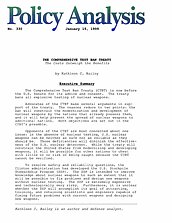The Comprehensive Test Ban Treaty (CTBT) is now before the U.S. Senate for its advice and consent. The treaty bans all explosive testing of nuclear weapons.
Advocates of the CTBT make several arguments in support of the treaty. The reasons reduce to two points: the ban will constrain the modernization and development of nuclear weapons by the nations that already possess them, and it will help prevent the spread of nuclear weapons to additional nations. Both objectives are set out in the CTBT’s preamble.
Opponents of the CTBT are most concerned about one issue: in the absence of nuclear testing, U.S. nuclear weapons can be neither as safe nor as reliable as they should be. Those deficiencies will diminish the effectiveness of the U.S. nuclear deterrent. While the treaty will constrain the United States from modernizing and developing weapons, it will be possible for other nations to cheat with little or no risk of being caught because the CTBT cannot be verified.
To resolve safety and reliability questions, the Clinton administration has developed the U.S. Stockpile Stewardship Program (SSP). The SSP is intended to improve knowledge about nuclear weapons to such an extent that it will be possible to fix problems and design new weapons without nuclear testing. The SSP is extremely expensive and technologically very risky. Furthermore, it is unclear whether the SSP will accomplish its goal of attracting, training, and retaining scientists and engineers capable of fixing future problems with current weapons and designing new weapons.
About the Author

This work is licensed under a Creative Commons Attribution-NonCommercial-ShareAlike 4.0 International License.
